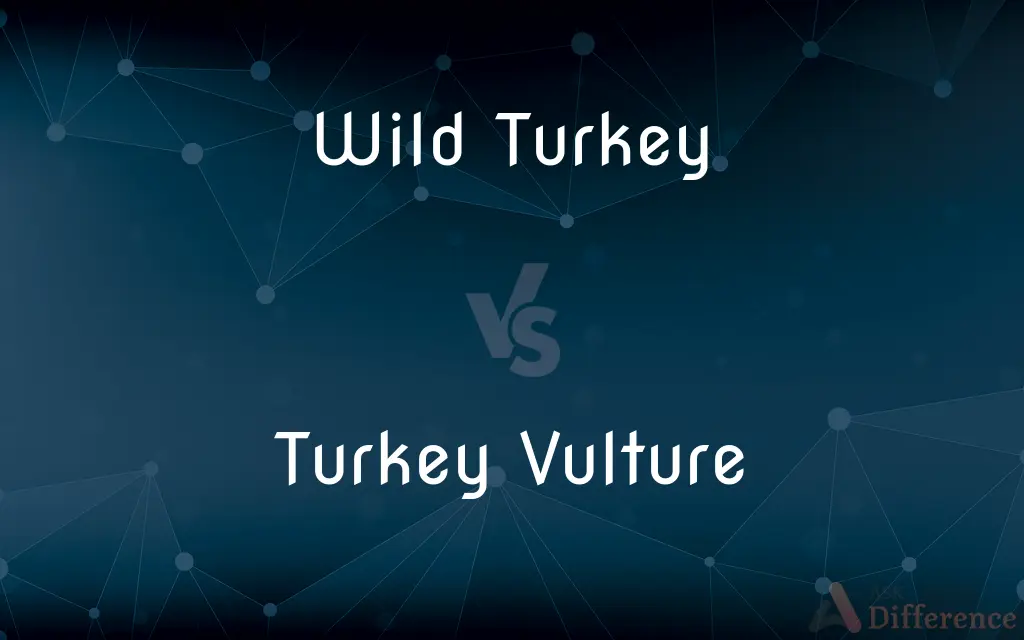Wild Turkey vs. Turkey Vulture — What's the Difference?
By Urooj Arif & Maham Liaqat — Published on March 2, 2024
Wild Turkey is a large game bird known for its significance in North American wildlife and Thanksgiving traditions, whereas the Turkey Vulture is a scavenger bird, recognized for its vital ecological role in decomposing carrion.

Difference Between Wild Turkey and Turkey Vulture
Table of Contents
ADVERTISEMENT
Key Differences
Wild Turkeys are known for their impressive size, vibrant plumage, and social behaviors, often seen foraging on the ground in flocks. These birds are native to North America and have been reintroduced in many areas where they had been previously extirpated. They play a significant role in cultural and culinary contexts, especially during Thanksgiving.
Turkey Vultures, contrastingly, are distinguished by their bald red heads, dark bodies, and large wingspans, which facilitate their soaring flight patterns. They are scavengers, feeding primarily on carrion, which makes them crucial for the ecosystem as they help in disposing of dead animals. Unlike Wild Turkeys, Turkey Vultures have a keen sense of smell, which aids them in locating their food.
Wild Turkeys are celebrated for their meat and are hunted as well as raised on farms, while Turkey Vultures are protected under the Migratory Bird Treaty Act of 1918 in the United States and Canada. This act makes it illegal to harm or kill Turkey Vultures, acknowledging their importance in nature.
Another difference lies in their reproduction and nesting habits. Wild Turkeys build their nests on the ground, carefully hiding them in dense vegetation, whereas Turkey Vultures often nest in secluded spots such as caves, hollow trees, or abandoned buildings, laying their eggs directly on the ground without constructing a traditional nest.
Despite sharing part of their names and both being birds, Wild Turkeys and Turkey Vultures lead very different lives, with the former being more associated with human culture and the latter playing a specific role in the ecosystem as nature's cleanup crew.
ADVERTISEMENT
Comparison Chart
Habitat
Forests, grasslands, and agricultural fields
Open and semi-open areas, including deserts
Diet
Omnivorous: seeds, insects, small animals
Scavenger: carrion
Nesting
Ground nests hidden in dense vegetation
Secluded spots without constructing nests
Significance
Cultural, hunting, and culinary
Ecological role in decomposing dead animals
Physical Appearance
Vibrant plumage, larger body size
Bald red head, dark body, large wingspan
Compare with Definitions
Wild Turkey
Game Bird.
The Wild Turkey is hunted for sport and its meat is a traditional Thanksgiving dish.
Turkey Vulture
Scavenger.
Turkey Vultures play a crucial role in ecosystems by consuming carrion.
Wild Turkey
Cultural Significance.
The Wild Turkey holds a place of honor in American culture and history.
Turkey Vulture
Soaring Flight.
Turkey Vultures are often seen soaring high in the sky, searching for food.
Wild Turkey
Nesting Habits.
Wild Turkeys nest on the ground, camouflaging their nests with dense vegetation.
Turkey Vulture
Nesting Sites.
Turkey Vultures use secluded spots like hollow trees for nesting.
Wild Turkey
Social Behavior.
Wild Turkeys form flocks and display complex social structures.
Turkey Vulture
Keen Smell.
Unlike many birds, Turkey Vultures have a highly developed sense of smell.
Wild Turkey
Ground Foraging.
Wild Turkeys are often seen foraging on the ground for seeds and insects.
Turkey Vulture
Protected Species.
Turkey Vultures are protected under the Migratory Bird Treaty Act, highlighting their ecological importance.
Common Curiosities
What do Wild Turkeys eat?
Wild Turkeys are omnivorous, feeding on seeds, nuts, insects, and small amphibians.
How do Turkey Vultures find their food?
Turkey Vultures have an exceptional sense of smell that helps them locate carrion.
Why don't Turkey Vultures have feathers on their heads?
The lack of feathers on their heads helps keep them clean while feeding on carrion.
What role do Turkey Vultures play in the ecosystem?
They help control disease spread by consuming dead animals.
Are Turkey Vultures social birds?
Yes, they are often seen in groups, especially during migration or when food is abundant.
Are Wild Turkeys good flyers?
Yes, despite their size, Wild Turkeys are strong flyers, especially over short distances.
Can Turkey Vultures smell carrion from a distance?
Yes, Turkey Vultures can detect the scent of decaying animals from miles away.
Is it legal to hunt Wild Turkeys?
Yes, with proper licenses and during specific seasons, it is legal to hunt Wild Turkeys.
How long do Wild Turkeys live?
In the wild, Wild Turkeys can live up to 10 years, though many live shorter lives due to predation and hunting.
Do Wild Turkeys migrate?
Wild Turkeys are mostly sedentary, though they may move locally depending on food availability and season.
What time of year do Wild Turkeys mate?
Wild Turkeys typically mate in the early spring.
How do Turkey Vultures stay cool?
They often defecate on their legs, using the evaporation to cool down.
What is the wingspan of a Turkey Vulture?
Turkey Vultures have a wingspan of about 160-183 cm (63-72 inches).
How do Turkey Vultures help control disease?
By consuming carrion, they prevent the spread of diseases that dead bodies can harbor.
Are Wild Turkeys native to North America?
Yes, Wild Turkeys are native to North America and have a significant presence in the continent's folklore and ecology.
Share Your Discovery

Previous Comparison
White Sapphire vs. Diamond
Next Comparison
Old Immigrants vs. New ImmigrantsAuthor Spotlight
Written by
Urooj ArifUrooj is a skilled content writer at Ask Difference, known for her exceptional ability to simplify complex topics into engaging and informative content. With a passion for research and a flair for clear, concise writing, she consistently delivers articles that resonate with our diverse audience.
Co-written by
Maham Liaqat















































